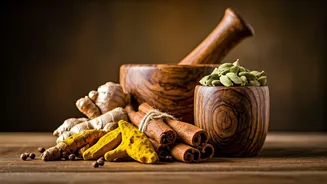Ayurveda and Bones
Ayurveda, the ancient Indian system of medicine, views bone health as intricately connected to overall well-being. According to Ayurvedic principles, bones
are formed from 'Asthi Dhatu,' one of the seven tissues of the body. Asthi Dhatu is believed to be nourished by healthy food and lifestyle practices. Ayurveda emphasizes balancing the 'Vata Dosha,' which governs movement, including the flow of nutrients to bones. When Vata is imbalanced, it can lead to bone loss and weakness. To support bone health, Ayurveda recommends dietary modifications, such as consuming foods rich in calcium and vitamin D, and avoiding processed foods. It also suggests lifestyle adjustments, including regular exercise and stress management techniques like yoga and meditation. Additionally, Ayurvedic practitioners may prescribe herbal remedies to strengthen bones and enhance overall health. For instance, herbs like Ashwagandha and Arjuna are believed to promote bone density. This holistic approach ensures not just bone strength but also a balanced body and mind.
Dietary Recommendations
Diet plays a crucial role in maintaining strong bones according to Ayurvedic principles. A balanced diet rich in calcium, vitamin D, and other essential nutrients is fundamental. Ayurveda suggests incorporating foods that support bone health and balance Vata Dosha. Dairy products like milk and yogurt are considered excellent sources of calcium. However, individuals with lactose intolerance can explore alternatives like almond milk or calcium-fortified plant-based milk. Leafy green vegetables such as spinach, kale, and collard greens, are also beneficial as they provide vitamins and minerals. Ayurveda recommends including healthy fats, like ghee and olive oil, in the diet, as they aid in nutrient absorption. It also emphasizes limiting processed foods, excessive sugar, and caffeine, which can weaken bones. Regular consumption of bone broth, known for its collagen content, is also promoted. Individuals should consult an Ayurvedic practitioner to create a personalized diet plan aligned with their body type ('Prakriti') and any existing imbalances. This ensures that the diet effectively supports their bone health and overall well-being.
Lifestyle Adjustments
Besides diet, Ayurveda emphasizes lifestyle changes to promote bone health. Regular physical activity, especially weight-bearing exercises like walking, running, and yoga, is crucial for stimulating bone formation. Ayurveda also emphasizes the importance of sunlight exposure to enhance Vitamin D production. Sun exposure helps the body produce vitamin D, which is essential for calcium absorption, thereby strengthening bones. Daily routines ('Dinacharya') as suggested by Ayurveda, including early to bed and early to rise, are conducive to bone health. Reducing stress through practices like yoga, meditation, and deep breathing exercises is also vital. Stress can exacerbate Vata imbalances, which can affect bone health. Adequate sleep is necessary for overall well-being, including bone health. Ayurveda suggests managing stress through practices like meditation and mindfulness. Incorporating mindful practices and regular exercise into daily routines is important for healthy bones and a balanced lifestyle, according to Ayurveda. Seeking advice from an Ayurvedic practitioner can help you establish a routine specifically designed to balance your Doshas and enhance bone health.
Herbal Remedies
Ayurveda employs various herbal remedies to fortify bones and foster overall well-being. Herbs like Ashwagandha (Withania somnifera) are known for their adaptogenic properties. They help the body adapt to stress and enhance overall health, indirectly supporting bone health. Arjuna (Terminalia arjuna) is often used to promote heart health but also supports bone health because of its antioxidant properties. Herbs like Shatavari (Asparagus racemosus) are often recommended for women’s health, supporting bone density. Herbs are typically administered after consultation with an Ayurvedic practitioner who can recommend customized formulations based on an individual's constitution and specific health needs. Ayurvedic formulations combine these herbs, often along with calcium-rich natural ingredients. Proper dosage and form (e.g., tablets, powders, or decoctions) are crucial for effectiveness. Using herbal remedies under expert guidance helps you gain maximum benefits and minimize risks. The integration of herbal remedies with dietary and lifestyle practices ensures a comprehensive and holistic approach to strengthening bones and boosting overall health.
Osteoporosis Prevention
Ayurveda provides preventative measures to combat osteoporosis and promote strong bones. Early detection of any imbalances is vital. Regular health check-ups and assessments by an Ayurvedic practitioner can help identify potential issues early. Following Ayurvedic guidelines from a young age is crucial, especially in bone health. This involves maintaining a balanced diet, engaging in regular physical activity, and managing stress levels. Ayurveda recommends specific practices to enhance bone density and slow down bone loss. Individuals should consume a diet rich in calcium and vitamin D and limit processed foods. Lifestyle changes, such as stress management techniques, are also important. Those at a higher risk of osteoporosis, such as postmenopausal women, should pay special attention to their bone health. They should consult with an Ayurvedic practitioner to create a personalized plan including dietary adjustments, lifestyle changes, and herbal remedies. Early intervention and the adoption of Ayurvedic practices can help prevent osteoporosis and maintain robust bones throughout life.













